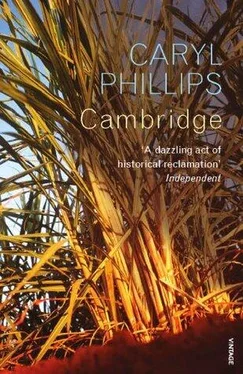Caryl Phillips - Cambridge
Здесь есть возможность читать онлайн «Caryl Phillips - Cambridge» весь текст электронной книги совершенно бесплатно (целиком полную версию без сокращений). В некоторых случаях можно слушать аудио, скачать через торрент в формате fb2 и присутствует краткое содержание. Год выпуска: 2009, Издательство: Vintage Digital, Жанр: Современная проза, на английском языке. Описание произведения, (предисловие) а так же отзывы посетителей доступны на портале библиотеки ЛибКат.
- Название:Cambridge
- Автор:
- Издательство:Vintage Digital
- Жанр:
- Год:2009
- ISBN:нет данных
- Рейтинг книги:5 / 5. Голосов: 1
-
Избранное:Добавить в избранное
- Отзывы:
-
Ваша оценка:
- 100
- 1
- 2
- 3
- 4
- 5
Cambridge: краткое содержание, описание и аннотация
Предлагаем к чтению аннотацию, описание, краткое содержание или предисловие (зависит от того, что написал сам автор книги «Cambridge»). Если вы не нашли необходимую информацию о книге — напишите в комментариях, мы постараемся отыскать её.
Cambridge — читать онлайн бесплатно полную книгу (весь текст) целиком
Ниже представлен текст книги, разбитый по страницам. Система сохранения места последней прочитанной страницы, позволяет с удобством читать онлайн бесплатно книгу «Cambridge», без необходимости каждый раз заново искать на чём Вы остановились. Поставьте закладку, и сможете в любой момент перейти на страницу, на которой закончили чтение.
Интервал:
Закладка:
I have received an awkward and somewhat surprising communication from Mr McDonald pertaining to last week's lunch with Mr Rogers and myself. It appears that Mr Rogers felt that his colleague's behaviour merited an apology of some form, so he persuaded Mr McDonald to set down his excuses on paper. Heat and drink, an excess of both, are his principal self-exonerations, these plus the novelty of a lady's company and the neglect of proper deportment in such circumstances. I answered briefly, dispatching the letter by way of Stella's network, assuring Mr McDonald that there was no necessity for such over-abundant apologies. If he felt that he had drunk a little too much and over-anointed his tongue, he might rest assured that he had let nothing slip which might be interpreted as in bad taste, nor had he been in any way offensive to myself. No sooner had the letter vanished from my sight than who should present himself at the door to my chamber but me correspondent himself, laden with freshly picked flowers and making supplication in a not wholly appealing fashion. I ushered my visitor back into the central hall where I promised I would soon engage with him. Stella was unable to erase the smile from her face. She took the flowers and undertook to find them a vase in which they might flourish.
I joined the good doctor and found that imp of satan, Aberdeen, perched at his feet and buffing up his boots, while the young scoundrel, Westmoreland, was one moment dusting down his massa's jacket and the next flicking an orange bough to keep flies and other insects from his person. I dismissed them hurriedly, and proceeded to take up my station in a lounger opposite to Mr McDonald's. I felt an unfamiliar discomposure in the good doctor's company, and thought it best myself to broach the choice of subjects. I declared myself glad that he had come to visit, but added that my time here seemed to be slipping by and still I knew little of anything beyond this estate. At this Mr McDonald seemed to find his cue. He suggested that I had almost regained full strength, and that we might explore the island in each other's company. I assured him that such a scheme might be most edifying. The project having been descanted upon and defined, we fell into silence. Then Mr McDonald rose from his chair, drew himself up to his full height and blurted out what he had truly come to deliver. As he did so his eyes glistened and his lips quivered with emotion. He warned me that Mr Rogers's affections for myself were of a not altogether honourable nature, and that I should be wary of how I might proceed with him. I tried hard not to laugh, for it was becoming apparent that both this clown, and his oafish friend, were engaged in some manner of feud for my favours, Mr McDonald being the more determined of the pair. I believed Mr Rogers's affection to be no more than mere fancy, whereas Mr McDonald's was evidently embossed with an altogether different stamp. I too rose from my lounger, and thanked Mr McDonald for his information. I accompanied him to the door, although his pace was somewhat too rapid for me. Having delivered his fabrication the tropical doctor wished now to escape as quickly as possible before being quizzed and discovered as a mischief-maker. I watched him until he disappeared over the side of the hill and was swallowed up by the shrubbery that clothed the rugged descent down to the island road.
As for Mr Brown's opinion of Mr McDonald, he had nothing to say in favour of Scotchmen. That indeed, as he made clear, was all there was to say on the matter. I asked him if it might not be possible for there to be worthy and honourable Scotchmen, but this seemed tantamount to asking Mr Brown to contemplate the existence of generous Jews or intellectually adroit negroes. Of late, as I sit on the piazza, or walk in the grounds, or recline in the central hall, or even as I take dinner, Mr Brown has fallen into the habit of appearing before me to engage in a few pleasantries. It seems as though his initial resentment at my presence has been eroded. Perhaps he has come to realize that I pose no immediate threat to the status quo. Perhaps the discovery that I am not the carrier of bad news has lightened his heart. He has informed me further on the fate of my father's agent, Mr Wilson. Apparently this man had been stealing from the estate and has fled to another island. Whether he so chose, or was compelled by force, is unclear. However, he no longer resides on these shores. It would appear that quite apart from petty thieving, the chief complaint against Mr Wilson was that he was not sufficiently aware of the imminent threat of a slave revolt.
This intelligence I gleaned from Mr Brown when again I made reference to his unnecessary savagery towards the negro Hercules, Cambridge. And again Mr Brown reminded me that the whites in these parts live in constant apprehension of revolt, for often the only reason negro attempts at insurrection meet with no success is their lack of any regular plan. Such eruptions occur with frequency and are met with equally fierce suppression, the latitude of punishment being curtailed only by the desirability of avoiding permanent injury to valuable stock. This negro rebelliousness has led to the need for organized militia under the command of the Governor. All whites between sixteen and sixty are obliged to serve, clergymen excepted, and troops are assembled for drilling once a month, and for manoeuvres on several days of each year. On negro play-days martial law is imposed and all militia men are required to be on duty. According to Mr Brown one of the chief sources of conflict between himself and Mr Wilson was the latter's attitude towards the organization of such militia. Apparently Mr Wilson viewed them as something of a prank, whereas Mr Brown, a man closer to the moods and vagaries of the blacks, viewed their continued existence as a matter of vital importance.
I have decided to write again to Father expanding upon the nature of this conflict between Brown and Wilson, and requesting him to investigate if in the last year there has been any marked fall in the level of profits from the estate. I would be surprised should there have been any decrease, since my intelligence tells me that for all his surliness Mr Brown knows well how to manage the negroes, and does so from what one might term ground level rather than by dispensing his justice or otherwise from on high. I find it difficult to comment upon white life style in anything other than general terms, for all I know comes from conversational skirmishes with Messrs Brown, McDonald and Rogers. I have, however, in the past week seen a little of negro life, and had the opportunity to converse with both black and white on this subject. The result is that I have made some observations which, ink, paper, and time permitting, I will certainly share with Father.
The negro forms the basis of the system and is of two sorts, the imported slave and the slave of local origin. It is desirable that a predominance of the former should rapidly be altered to a majority of creole slaves. Slaves of various tribal stock, some superior in nature, some inferior, are represented, and some tribes are better suited than others to certain modes of work. Yet with the passage of time, and inter-breeding among the tribes, the single, indistinguishable Creole black emerges, who, having been in contact with whites from his birth, and having the great advantage of familiarity with only the English language, is less intractable, more intelligent, and less likely to provoke discord. He has not about him the offensive pride and natural ferocity of the African, who, having been torn from his native country, and made to toil under a burning sun in mortal fear of the lash, is hardly likely to form a favourable opinion of his masters. Memory often transports him back to his native land, where he roams in pursuit of the lion or leopard, or seeks noonday rest neath the shade of Afric's huge trees with family and friends about him, their voices raised in gentle song. Yet memories of such scenes are soon disrupted by the crack of the driver's whip, or the coarse bellow of an overseer, and the African is reduced to despair, and it is at such moments that the dark spirit of revenge enters his unChristian soul. It is to be hoped that this process of creolization will soon replace all memories of Africa, and uproot such savage growths from West Indian soil.
Читать дальшеИнтервал:
Закладка:
Похожие книги на «Cambridge»
Представляем Вашему вниманию похожие книги на «Cambridge» списком для выбора. Мы отобрали схожую по названию и смыслу литературу в надежде предоставить читателям больше вариантов отыскать новые, интересные, ещё непрочитанные произведения.
Обсуждение, отзывы о книге «Cambridge» и просто собственные мнения читателей. Оставьте ваши комментарии, напишите, что Вы думаете о произведении, его смысле или главных героях. Укажите что конкретно понравилось, а что нет, и почему Вы так считаете.












